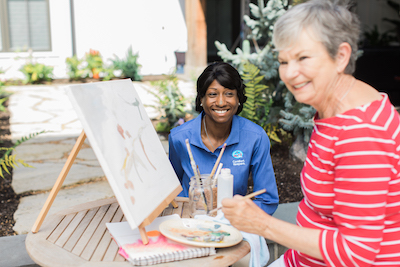Dealing with a Cancer Diagnosis Later in Life
Being diagnosed with cancer later in life can be scary and overwhelming. A cancer diagnosis can make a person feel like their world is out of control.
60% of people who have cancer are 65 or older.

Being diagnosed with cancer later in life can be scary and overwhelming. A cancer diagnosis can make a person feel like their world is out of control. People often say they feel helpless and powerless after they find out they have cancer.
However, many find that making a personalized plan for dealing with a cancer diagnosis can help older adults make treatment decisions and feel in control of their lives again. And, by taking intentional action, it is possible to continue to focus on quality of life and joyful moments even in a difficult time.
Here are some strategies for coping with a cancer diagnosis:
- Absorb the information – People need to give themselves as much time as they need to take in the news. Processing a diagnosis can be difficult, and the person should feel comfortable taking the time and space they need to come to terms with the next steps in their treatment plans.
- Encourage education– As the saying goes, “Knowledge is power.” Encourage them to learn as much as they can about their type of cancer and the treatment options available. Health care professionals are more than willing to provide resources to help someone understand their diagnosis.
- Express feelings – It’s normal to feel depressed, angry, sad or overwhelmed after being diagnosed with cancer. There are many opportunities to talk about their feelings, whether it’s with someone in their life that they trust, a mental health professional or a local support group.
- Maintain healthy habits – Continuing healthy habits is important following a cancer diagnosis. Those with a cancer diagnosis should follow a doctor’s advice regarding nutrition and exercise, and make an effort to take care of themselves mentally and physically.
- Evaluate financial needs –Reviewing insurance and having a plan for how they will pay for their treatment will help relieve stress down the road.
- Focus on other parts of life –Focusing on the things in life that can be controlled will help people remember that they have the power to decide how they live life.
Comfort Keepers® Can Help
If you need help during your battle with cancer, Comfort Keepers provides services for clients with a range of needs and physical abilities. Whether it is a ride to the doctor or help around the house, our goal is to provide compassionate care that helps clients find the joy and happiness in each day.
To learn more about our in-home care services, contact your local Comfort Keepers location today.
References
Cancer.net. “Aging and Cancer.” Web. 2018.
American Cancer Society. “Coping with Cancer.” Web.
American Society of Clinical Oncology. “Geriatric Oncology.” Web.
Sign up to receive helpful info right to your inbox.
We understand choosing an in-home care provider can be a difficult decision, and we want to make your journey as easy as possible. We're here to support you by providing helpful senior care tips and information on in-home care and senior health and wellbeing topics.
Start a Job with a Purpose
Uplifting training and support for you every step of the way.
Apply to be a caregiver







